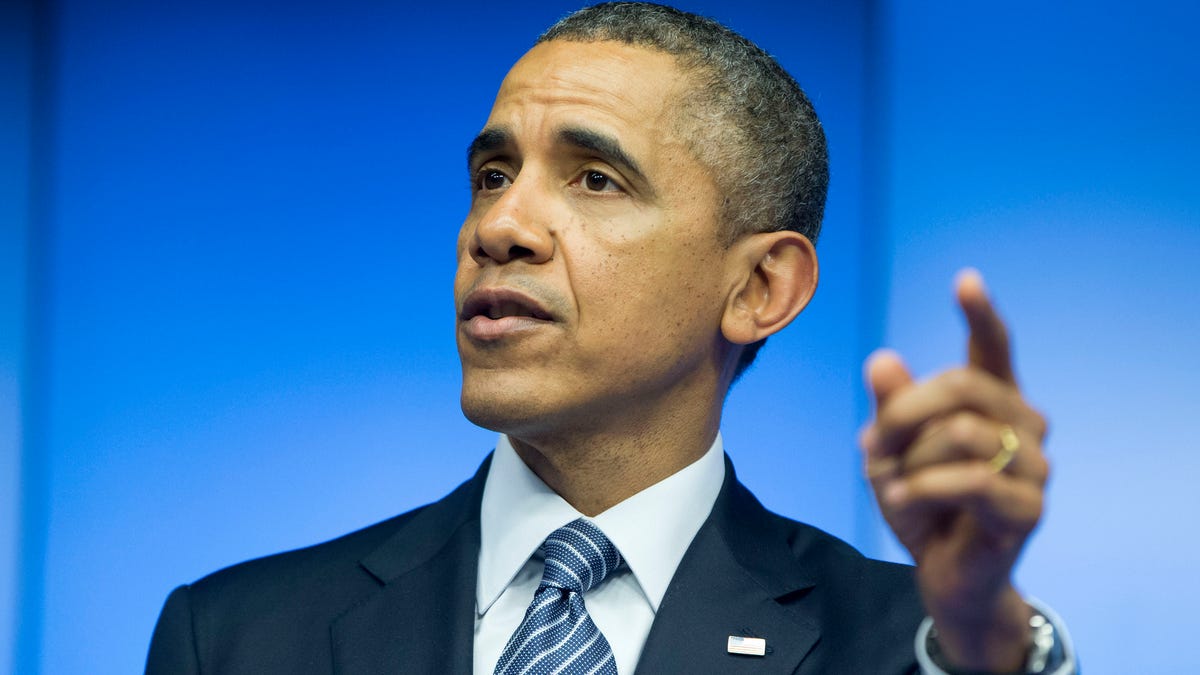
President Obama speaks during a joint news conference with EU Council President Herman Van Rompuy and EU Commission President Jose Manuel Barroso at the EU-US summit meeting. (AP)
President Obama threatened a new round of sanctions against Russia on Wednesday, this time aimed at the country’s energy sector.
Obama, speaking at a news conference at the Council of the European Union, said the crisis in Ukraine underscored Europe’s need to become less dependent on Russia’s rich energy sources.
He also acknowledged that additional sanctions could affect Russia’s neighboring countries but said the United States was committed to helping those nations find energy alternatives. Obama said coordination between the U.S. and Europe on economic sanctions against Russia has been excellent and warned that if Russia continues on its current course, "the isolation will deepen."
“Russia stands alone,” he said. “Russia stood alone when trying to defend its actions at the U.N. Security Council, the 28 members of the European Union are united, the 28 members of NATO are united, every member of the G7 has imposed sanctions on Russia as we announced on Monday, and the G7 will meet here in Brussels in June – without Russia.”
The president went on to say if “Russian leadership thought the world wouldn’t care about their actions in Ukraine, or that they could drive a wedge between the European Union and the United States, they clearly miscalculated.”
Obama spoke to reporters after a working lunch with European Council President Herman Van Rompuy and European Commission President Jose Manuel Barroso which participants said was dominated by discussion of Ukraine. Van Rompuy called Russia's action in Crimea "a disgrace in the 21st century, and we will not recognize it."
The international leaders also expressed confidence they would reach an ambitious trans-Atlantic trade partnership, which Obama noted has a Ukraine connection because it could provide a counterweight to Russian energy leverage in Europe.
Obama gave a second televised speech Wednesday at the Palais des Beaux-Arts, one of the most prominent cultural sites in Belgium. During that 37-minute address he warned that Russian President Vladimir Putin’s actions in Ukraine displayed hints of “the darker forces of our past.”
Yet, Obama said, “ Make no mistake, neither the United States nor Europe has any interest in controlling Ukraine. Understand as well, this is not another Cold War that we're entering into. “
Obama's stewardship of U.S.-European relations has been hurt by revelations of communications prying by the U.S. National Security Agency. Van Rompuy said E.U. leaders conveyed their concerns directly to Obama in their meeting, and Obama agreed to take aggressive steps to address the issue. Van Rompuy called for "equal treatment of EU and US citizens," who have more privacy protections.
With tensions running high on the continent, Obama earlier called for a recommitment to peace during a solemn pilgrimage to Flanders Field American Cemetery and Memorial in northwest Belgium.
"This visit, this hallowed ground, reminds us that we must never ever take our progress for granted," Obama said. "We must commit perennially to peace, which binds us across oceans."
Followed by the stirring sound of a bugler playing Taps, Obama joined Belgian Prime Minister Elio Di Rupo and King Phillipe in laying a trio of wreaths at the white stone monument at the center of the cemetery, the site of a significant World War I battle. The three leaders then walked among some of the white crosses that mark the burial site of 368 American troops, most of whom gave their lives in liberating Belgium from German occupation.
The Belgian leaders did not mention Russian President Vladimir Putin by name in remarks afterward, but clearly were referencing his audacious annexation of Crimea as they recalled the lessons of world war.
"Our countries have learned the hard way that national sovereignty quickly reaches its limits" when confronted with armed adversaries, who don't respect that sovereignty, said King Phillipe.
"We have to continue to draw lessons from the terrible war that started 100 years ago," Di Rupo said. "And, above all, we have to prevent new conflicts. Those who ignore the past are taking the risk to relive it."
Obama came to Brussels to shore up commitments he received from allies in The Hague, Netherlands, to reassure Eastern European members of NATO that the alliance will stand by them and to make a larger point about European security a quarter-century after the fall of the Iron Curtain. He held a working lunch with European Union officials and later was to meet with NATO Secretary General Anders Fogh Rasmussen, embracing the alliance born as a bulwark against the Soviet Union.
The president, stepping up the task of solidifying broad-based support against Russia, dismissed Russia a day earlier as a mere "regional power" that was threatening its neighbors "not out of strength, but out of weakness." He said that as president, he worried more about a nuclear device in Manhattan than he did about Russia.
It was the kind of brush-off-your-shoulder language sure to antagonize the nationalistic Putin, but it also belied the time and energy Obama and European leaders have devoted to isolate Russia and fashion a menu of sanctions designed to stop Moscow's aggression.
Obama planned to conclude his day with his only speech of the weeklong, four-country trip, tying the current Ukraine crisis to his vision of the United States and Europe as anchors of democracy and international law.
The Associated Press contributed to this report.




